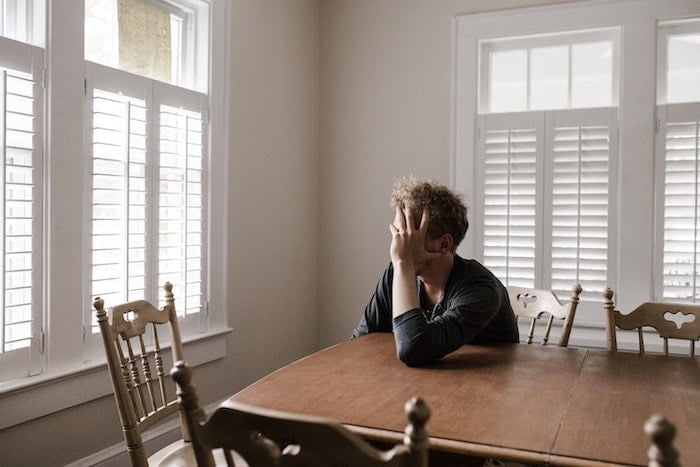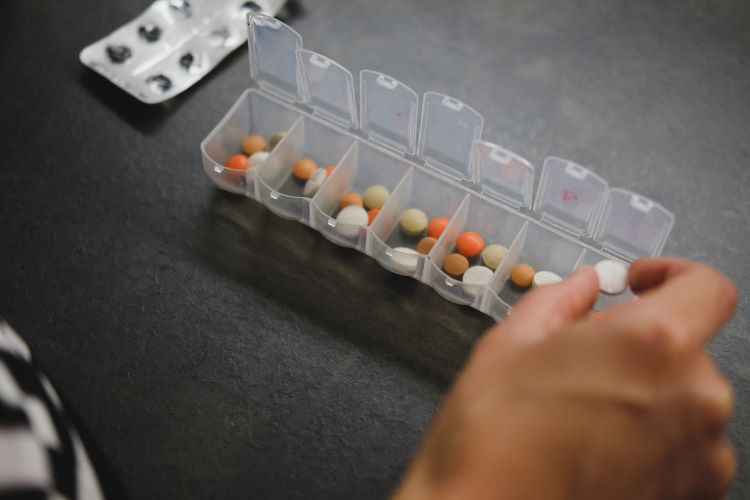Quick links for depression
- What is depression?
- What are the signs and symptoms of depression?
- Risk factors shared by depression and addiction
- Depression and addiction
- Getting addicted because of depression
- Depression and addiction – Making things worse
- Treatment for depression and addiction
- How to get more information about depression and addiction
- References for depression and addiction
Depression is a condition that impacts many people.
It mainly involves intense and prolonged feelings of sadness, but the condition can affect everyone differently.
Symptoms can impact psychological, emotional, and physical health, and they can vary in how often they arise.
Unfortunately, those who experience depression can often struggle with suicidal thoughts.
It is common for individuals with depression to also develop an addiction, stemming from the relaxing effects that substances such as alcohol provide.
While using these materials can be effective at first, they can exacerbate depression symptoms in the long run, ultimately making things worse.
What is depression?

Two men sat together discussing the link between depression and addiction
When an individual experiences depression, it is much more than simply feeling down or upset. Instead, it is a complex condition that impacts people differently.
Predominantly, it involves intense and prolonged feelings of sadness, doubt, and hopelessness. [1]
Individuals can lose interest in things, distance themselves from others, and have suicidal tendencies.
In spite of the negative connotations of depression, it is not something that an individual can simply ‘snap out of’ or get over.
It can last for months or years, and greatly impact an individual’s physical wellbeing.
What are the signs and symptoms of depression?

Man suffering from the symptoms of depression and addiction
Depression primarily disrupts an individual’s psychological and emotional stability, but this can also have a great influence on their social life and physical health.
Individuals can express different signs of depression, but some of the common symptoms include: [2]
- Intense feelings of hopelessness and sadness
- Inability to feel pleasure
- Insomnia or poor quality of sleep
- Staying in bed throughout the day
- Intense feelings of guilt
- Disinterest in hobbies and social life
- Increasing social isolation
- Fatigue and lack of motivation
- Poor performance/attendance in school or work
- Intense feelings of worthlessness
- Inability to concentrate
- Intense feelings of frustration or anger
- Loss of appetite
- Bodily discomfort, including aches and pains
In many cases, a combination of these symptoms will have a significant influence on an individual’s behaviour.
They may begin acting in a more reckless, risk-taking way, or may start having suicidal thoughts.
Risk factors shared by depression and addiction

Patient and therapist talking about depression and addiction
There is no single reason why an individual will develop depression.
Each person will be influenced by a number of factors that can interact in numerous complex ways. [3]
These include:
- Genetics – Much like other mental health conditions, there is a degree to which depression is inherited through our genes
- Traumatic events – Depression can develop as a result of an injury, death in the family, or relationship breakdown
- Personality – If an individual has low self-esteem, low self-worth, or a largely pessimistic worldview, they will be more likely to develop depression
- Social life – Those who spend little time with friends and family tend to be more vulnerable to depression due to a lack of emotional support
- Giving birth – The hormonal rollercoaster of having a baby can leave a new mother feeling an array of emotions, and depression shortly after giving birth is very common
- Medications – Some medications are known to increase an individual’s susceptibility to depression symptoms [4]
- Substance use – Those who consume large amounts of alcohol or recreational drugs can find that the effects of these substances leave them feeling depressed
As noted above, it is how these factors interact with one another which dictates an individual’s chances of developing depression.
For example, a traumatic event may not be enough on its own to trigger the condition, but if the individual also has low self-esteem and no social life, the chances are increased.
Depression and addiction

Two women sat together talking seriously about depression and addiction
Research suggests that it is common for individuals with depression to develop an addiction. [5]
Although the relationship between the two conditions is complex, a large reason why this happens stems from the sedative effects that substances such as alcohol and recreational drugs offer to those with depression.
The relaxing and numbing effect that these substances provide make them an accessible method for individuals to soothe their depression symptoms.
Instead of feeling sad, hopeless, or frustrated, they can turn to a substance in order to feel happy, relaxed, or sleepy.
Getting addicted because of depression

Patient sat at home talking with a therapist about depression and addiction
When an individual first begins using a substance to soothe their depression symptoms, its sedative qualities will relax them, ease their negative emotions, and make it easier for them to sleep.
Because of this, they are encouraged to begin turning to the substance more often as a means of treatment.
It will continue to work, but the body will slowly begin getting used to the substance being in its system.
Over time, the body will gradually develop a dependency.
Its chemistry will begin moulding itself around the substance’s presence, so much so that it will become chemically imbalanced when it is taken away.
As a result, an individual will experience uncomfortable or, in the case of alcohol, dangerous withdrawal symptoms when they stop using it.
Depression and addiction – Making things worse

Support worker comforting someone suffering from depression and addiction
When faced with these withdrawal symptoms, individuals tend to continue using their chosen substance.
However, they will gradually find that they need to consume increasing amounts of it in order to achieve the same sedative effect they got in the beginning.
This is because the body gradually develops a tolerance for a substance as it is increasingly exposed to it.
Therefore, the initially positive effects of the substance are not as easily achieved as they once were.
For substances such as alcohol, this sedative effect is replaced over time with a largely negative one. Alcohol is a depressant, meaning that its overall impact on the brain is one that unsettles thoughts and lowers mood.
As a result, those who consume alcohol frequently tend to find that, while it initially helped, the substance is making their depression symptoms worse.
To combat this, an individual will seek to consume more of it to overcome their tolerance and achieve its sedative effect again, pushing them further down the addictive cycle.
Treatment for depression and addiction

Woman speaking with an addiction specialist about substance use and depression
For those with depression, treatment can take on several forms.
The condition can impact people in a variety of ways, and therefore different people’s experiences will require different methods of treatment.
In the case of depression also fuelling an addiction, it is essential that an individual is treated for both at the same time.
This is because the conditions will be interconnected – the depression fuelling the substance use, the addiction exacerbating the depression symptoms – and so effective treatment of one will only be possible by considering the other.

Patient taking medication for depression and addiction
Treating depression
The chosen method for treating depression will largely depend on its severity.
For those with mild depression, a medical professional will likely advise an individual to begin by engaging in self-help techniques where they look to improve their condition by adopting new habits and routines.
This might include doing regular exercise, reading self-help books, or engaging with mental health apps on their phone.
The effectiveness of these methods will be monitored, but further help will be implemented if there is no improvement.
For persistent or severe depression, a combination of medicinal and therapeutic methods can be employed.
This involves the prescription of antidepressants – a medication designed to ease depression symptoms – and engagement with talking therapies.
The goal of therapy is to allow an individual to discuss their thoughts and feelings and develop a better understanding of their condition and what they can do to make it better.
This can take the form of one-on-one counselling, peer support groups and Cognitive Behavioural Therapy (CBT).
In CBT, an individual is encouraged to identify what situations, thoughts or emotions trigger or exacerbate their depression symptoms, and develop alternative methods of responding. This therapy looks to replace negative reactions with healthy routines where possible. [6]

Support group discussing the link between depression and addiction
Treating addiction
In tandem with methods for treating depression, an individual will also need to treat their substance abuse and break their body’s dependency.
The primary way of doing this is through detoxification, which involves an individual discontinuing their use of a certain substance with appropriate medical support.
In most cases, detoxification can be an uncomfortable and life-threatening process.
Stopping substance use will induce a variety of withdrawal symptoms, and these can decrease the chances of detoxification being successful.
As a result, it is essential that an individual attempting to stop their substance use does so with the help of medical professionals.
Within a dedicated local rehab centre, an individual’s health can be monitored, and medicinal substitutes can be prescribed to ease withdrawal symptoms if required.
Alongside this weaning of the body, an individual can also benefit from participating in therapy
CBT can also be used here to work through what situations provoke an individual to abuse their chosen substance.
These will often be the same situations as those which provoke their depression symptoms, further emphasising the importance of addressing both conditions at once.
How to get more information about depression and addiction

Two people holding hands whilst talking about depression and addiction
If you or someone you know is struggling with depression, it is important that you seek help and speak to a medical professional.
The condition can be incredibly dangerous, so speak to a GP to discuss what support and treatment methods are available.
In the event of substance abuse also becoming a problem, speak to a GP and discuss what facilities are available to provide treatment.
References for depression and addiction
- https://www.mind.org.uk/information-support/types-of-mental-health-problems/depression/symptoms/
- https://www.nhs.uk/mental-health/conditions/depression-in-adults/symptoms/
- https://www.nimh.nih.gov/health/topics/depression/
- https://www.ncbi.nlm.nih.gov/pmc/articles/PMC3181967/
- https://www.ncbi.nlm.nih.gov/pmc/articles/PMC2851027/
- https://www.rcpsych.ac.uk/mental-health/problems-disorders/depression






